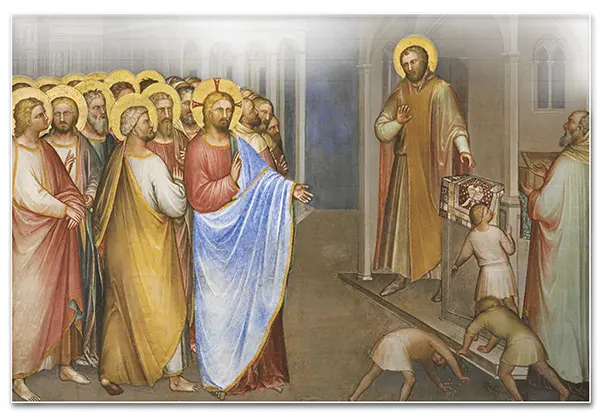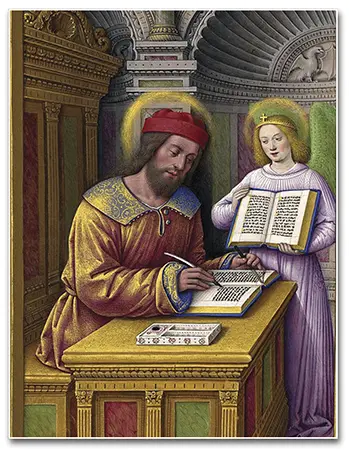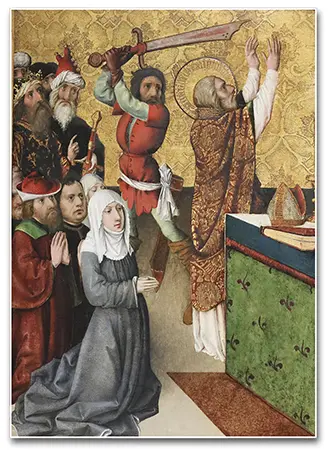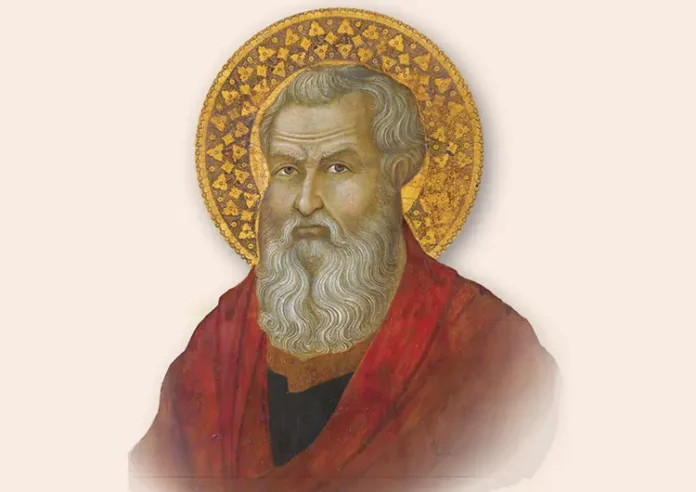It is proper to a foundation to support the building without being considered or even seen; although indispensable, it remains hidden.
The foundations of the Church are the twelve Apostles (cf. Rv 21:14), whose exceptional virtue has moved the devotion of Catholics of all times. However, if the magnitude of a building is measured by its structures, how can we not glimpse an untold greatness in the Apostles? The Sacred Heart of Jesus turned His gaze on them with predilection, calling them to an intimate relationship (cf. Lk 6:12-16; Mk 3:13-19), He prayed to the Father for them (cf. Jn 17:9), He instructed and formed them, and it was upon them that He chose to build His immortal and holy Church (cf. Mt 16:18-19).
It can be said that the moral stature of the Apostles is still unfathomed by history. In an attempt to penetrate the mists that cover it, let us consider from among this chorus of privileged men one in particular, commonly known as simply one of the Evangelists: St. Matthew.
Who was Matthew?
Capernaum, a town on the border of Galilee, was a busy port due to the continuous influx of people and merchandise from north and south, east and west. Many tax collectors were stationed there to collect the tributes demanded by the Roman Empire. They were called publicans, since they dealt with public affairs, a profession rarely carried out in those days without incurring sin…
In the exercise of his function, the publican had to pay the government the stipulated sum, but he kept the excess amount for himself, and dishonest extortion for personal gain was common. Tax collection was therefore held as “a shameless trade, rapine under a thin guise of legality,”1 which is why its agents were especially despised – indeed hated by the people, and considered to be criminal thieves.
In this category of men was Matthew, respectfully referred to by St. Luke (cf. Lk 5:27) and St. Mark (cf. Mk 2:14) only as Levi. Originally from Galilee, little is known about his ancestry, except that he was the son of Alphaeus. Everything suggests that he collected tolls from those who crossed the Lake of Gennesaret, as well as the imposts on goods that arrived there. Perhaps that is why the Gospel in Hebrew, when referring to him, uses the expression master of the passage instead of the word publican.2
So Levi was hard at work at his trade when an event changed the course of his life.
A decisive moment in an exchange of glances
After healing a paralyzed man in one of Capernaum’s houses, Jesus went to the outskirts of the city, on the shores of the Sea of Galilee. As He was preaching to the crowd that accompanied Him, “He saw Levi the son of Alphaeus sitting at the tax office, and He said to him, ‘Follow Me’” (Mk 2:14).
Jesus saw him! What look did the God-Man direct at that publican, at whom hardly anyone would deign to cast a glance? A truly divine look, penetrating, profound and overwhelming; filled with love, kindness and compassion. A restorative gaze whose mute language expressed more than the eloquence of many persuasive speeches. In fact, what Levi understood in an exchange of glances, had to be explained to the rich young man in a detailed piece of advice: “If you would be perfect, go, sell what you possess and give to the poor, and you will have treasure in Heaven; and come, follow Me” (Mt 19:21).
These two words were enough for Levi: follow Me! And “he left everything, and rose and followed Him” (Lk 5:28). With what intonation of voice did Jesus pronounce this imperious call? What must have been going on inside that new disciple for him to renounce everything?
For the naturalistic mind, it is hard to understand the speed of a decision that on the surface seems impulsive and immature. But Levi had already been prepared by Providence since childhood. Not having found a cause to which he could devote himself entirely, “he tried his hand at collecting taxes, unconcerned with the societal contempt this would bring him.”3
Levi’s hope had been ignited by the people’s excitement over the wonders performed by Jesus in Galilee, and there is every reason to believe that he had joined the ranks of those who listened to the Master’s preaching. “If magnets and amber are said to have such power that they bind together rings, straw and herbs, how much more could the Lord of all creatures draw to Himself those He wanted!”4

“The Calling of St. Matthew”, by Giusto de Menabuoi – Cathedral of Padua (Italy)
Generosity, readiness and courage
Such was the irresistible force emanating from the Master that Levi, once intent on amassing wealth through illegitimate profits, sacrificed all his ambitious plans in an instant and gave up his fortune. He did not bother to get rid of his possessions, he did not set about auctioning off his land and property, he did not even finalize the accounts in the telonium, caring little about the possible lawsuits that the Roman officials might bring against him…5 Grace had snatched him away!
An expert in calculating earthly values, he did not risk losing the priceless gift of grace offered to him, he did not hesitate between God and the world. In this we can glimpse the Apostle’s nobility of character, the heroism that made him willing to abandon the stability of his life and his great wealth to follow the Master into the unknown. He was a magnanimous soul, a “model of a serious, august, intrepid and courageous man!”6
Many of the Holy Fathers appreciate the generosity with which Levi gave himself to the Lord and emphasize his praiseworthy readiness, the courage with which he faced obstacles and opposition, subduing even his passions, as well as his constancy in following Jesus, which led him to persevere in his first resolutions until the end of his days.
Having renounced everything, he even put on a feast for Our Lord as a token of his gratitude.
A feast for the Master
“Levi made Him a great feast in his house” (Lk 5:29).
The great celebrations of the time took place around the table. In the Gospel parable, the father offers a banquet to the prodigal son who returns (cf. Lk 15:23); here Levi, made a son of God, offers a banquet to the One who saved him from sin and death; if that father’s joy was great, Jesus’ happiness was much greater when He saw the liberality of His new disciple. Without a doubt, among all the delights offered, none satisfied Him as much as Levi’s good dispositions. Both their hearts were already beating in unison!
What absorbing converse was held at that banquet? What bonds were forged? Immortal resonances between Creator and creature, between Master and disciple, which echo throughout the centuries in the simplicity of the Gospel: “as He sat at table in the house” (Mt 9:10)…
Matthew means gift of God, and perhaps this is the representative name that the Lord gave him to mark his new life. In fact, he was no longer the same and, as an omen of his future apostolic labours, he invited his friends to the banquet, among other reasons to allow them to share in Jesus’ company.
“I have stripped myself of the publican and put on Christ”
Seeing the Master and His disciples eating at table with sinners and publicans, the Pharisees and disciples of John the Baptist became indignant (cf. Mt 9:11, 14). Clinging to outdated criteria, they found it incomprehensible that the Saviour would condescend to seek out the lost sheep, and would exercise His office even in the intimacy of that banquet. This provided the occasion for Jesus to pronounce the reason for His earthly mission: “Those who are well have no need of a physician, but those who are sick. […] For I came not to call the righteous, but sinners” (Mt 9:12-13).
And in order to prove that Matthew had already begun the new life of grace that He was offering the world, Our Lord made it clear to those malicious hearts: “new wine must be put into fresh wineskins” (Lk 5:38).
As a renewed man, Matthew welcomed Jesus, the New Adam, into his home. In this sense, St. Ambrose7 piously describes the convert’s dispositions at the time, which could be summarized as follows: “Behold, I am no longer a publican; I no longer carry within me the figure of Levi. I have stripped myself of him and put on Christ; I am fleeing from my old life! Listen to me, men whose minds are oppressed by sin. I too was wounded by such passions and I have found a Physician who lives in Heaven and pours out His medicine on earth. He alone was able to heal my wounds.”
In this way the Master convoked another of those called to follow Him. And since He would only live a few years in this world, at the very beginning of His public life He wanted to directly associate some of them with His saving mission. Among these chosen was St. Matthew.
Among the Lord’s chosen
With the solemnity befitting God’s works, Jesus withdrew to a mountaintop, where He spent the night in prayer. At daybreak, He called those He wanted, and chose twelve from among His disciples to remain with Him, whom He named Apostles (cf. Mk 3:13-15; Lk 6:12-13). He gave them the power to cast out demons and to cure every evil and disease; then He instructed them on their future ministry (cf. Mt 10).
Radical by nature and conviction, Matthew likely stood out for his idealism and generosity, which once again earned Jesus’ favour, being chosen as one of His closest associates. He enjoyed the Lord’s friendship! Nevertheless, the silence and discretion of this Saint reveal a peculiar unpretentiousness, typical of one who knew how to hide and humble himself, as can be seen in the Gospel he wrote, when he adds the appellation “publican” (10:3) when he is named in the list of the twelve Apostles. He was aware of his former state and knew himself to be the object of the Lord’s mercy.

St. Matthew writes his Gospel, “The Grandes Heures of Anne of Brittany” – National Library of France, Paris
What relationship did he have with the Master? What was his role with the other Apostles? He never returned to his former office; so what did he do, for example, while the others fished? Mysteries and conjectures combine, as they do with all the Apostles. Unfortunately, history has not recorded further details about them. However, it is certain that, as a member of the Apostolic College, Matthew witnessed the most varied scenes in his contact with the Saviour; he was able to contemplate Him among the crowds performing all sorts of miracles, in moments of solitude, in moments of intimacy, and at the height of the manifestation of His divine love, the Last Supper.
And if no word of this Apostle has passed into history, his was the honour of being the first to immortalize the Saviour’s actions and instructions through the writing of the Gospel.
From fiscal calculations to compiling of the Redeemer’s deeds
Tradition tells us that, after the Ascension of Our Lord, Matthew preached along with the other Apostles in the provinces of Judea and surrounding areas. Before dispersing throughout the world, many converted Jews and other Apostles begged the Saint to record the story of Jesus. He did so, drawing up the foremost of the Lord’s great deeds and compiling them with his characteristic simplicity and precision. This, indeed, was an unprecedented collection of true riches!
Having accomplished this mission, he set out to evangelize new lands, and the last place he is recorded as having been was Ethiopia, one of the most difficult and inaccessible regions of the time. After a life filled with sacrifices and penance, coupled with cruel persecutions, the hour of eternity struck for him. Under the orders of the perfidious Emperor Hirtacus, he was killed on the very altar where he had just celebrated Holy Mass. Thus, he fulfilled the Master’s call: “Follow Me!” Matthew followed Him in pain and complete immolation and would follow Him into glory, where that divine gaze that had confiscated him would never again be taken from him!
He thus left a luminous trail of generosity, sacrificial love, and radicalism for people of all time. He proved himself to be great in his giving and in his works because he had been loved and amply forgiven. Faithful to this first calling, he remained constant in following Jesus and earned the crown of glory.

“The Martyrdom of St. Matthew” – Augustinian Museum, Freiburg im Breisgau (Germany)
Columns and foundations
St. Matthew, along with the other Apostles, is a beacon of light in the world, a patriarch of humanity in the spiritual and eternal order. Such inalienable prerogatives make him an exceptional figure.
Now, foundations alone do not make the building. It is in the same Christ that we were also chosen to be living stones of the Church; it is in Him that “the whole structure is joined together and grows into a holy temple in the Lord” (Eph 2:21).
When, finally, the building up of the Church is complete, the time will have come for Our Lord Jesus Christ’s definitive union with her. Then it will be said: “His Bride has made herself ready” (Rv 19:7). On the foundations, all the walls will have been raised, the columns fortified, the edifice completed! And a song will resound into eternity: “Come, ‘number her towers’ (Ps 48:12), contemplate her in her splendour, in her perfect stature. ‘Blessed are those who are invited to the marriage supper of the Lamb’ (Rv 19:9).” ◊
Notes
1 ST. JOHN CHRYSOSTOM. Homilías sobre el Evangelio de San Mateo. Homily XXX, Madrid: BAC, 1955, v.I, p.596.
2 Cf. MAISTRE, Étienne. Histoires scientifiques et édifiantes de chacun des grands et bienheureux Apôtres S. Philippe, S. Barthélemy, S. Matthieu, S. Thomas, S. Jacques-le-Mineur. Paris: F. Wattelier, 1870, p.155.
3 CLÁ DIAS, EP, João Scognamiglio. “Follow Me”, a Call for Everyone. In: New Insights on the Gospels. Città del Vaticano-Nobleton: LEV; Heralds of the Gospel, 2013, v.II, p.136.
4 ST. JEROME. Comentario a Mateo. L.I, c.9, n.20. In: Obras Completas. Madrid: BAC, 2002, v.II, p.95.
5 Cf. MAISTRE, op. cit., p.158.
6 CORRÊA DE OLIVEIRA, Plinio. Sério, altaneiro e intrépido [Serious, Noble and Intrepid]. In: Dr. Plinio. São Paulo. Year XVII. No.198 (Sept., 2014), p.2.
7 Cf. ST. AMBROSE. Tratado sobre el Evangelio de San Lucas. L.V, n.27. In: Obras. Madrid: BAC, 1966, v.I, p.243-244.


